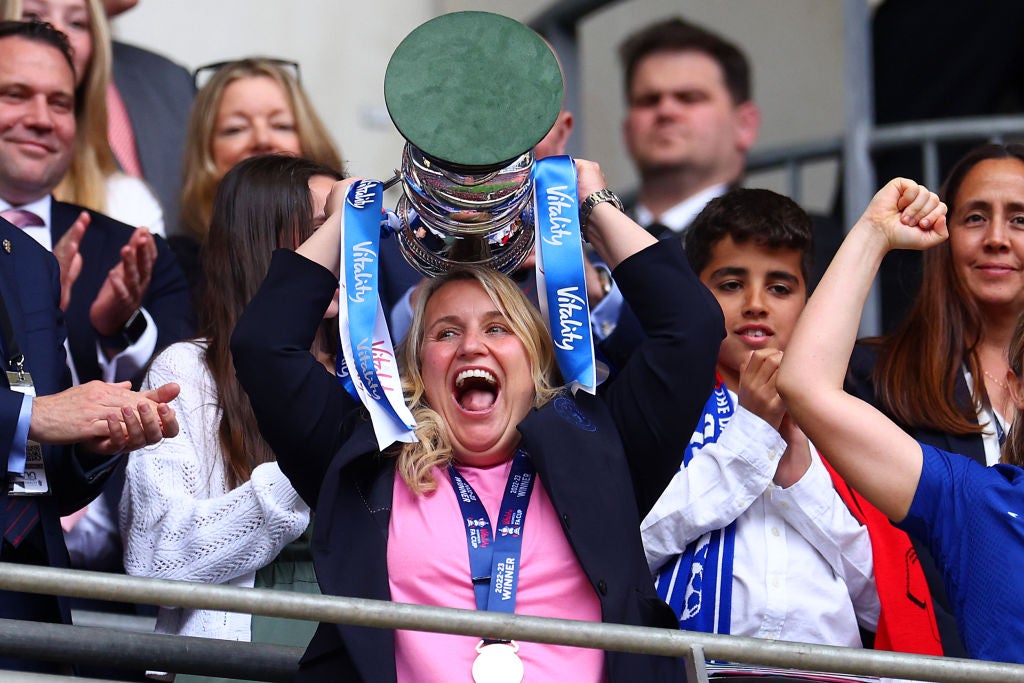How Chelsea turned ‘the grind’ into an art form to continue FA Cup dominance
Chelsea’s triumph over Manchester United at Wembley was a rebuttal to the notion that winning football needs to be ‘perfect’

Your support helps us to tell the story
From reproductive rights to climate change to Big Tech, The Independent is on the ground when the story is developing. Whether it's investigating the financials of Elon Musk's pro-Trump PAC or producing our latest documentary, 'The A Word', which shines a light on the American women fighting for reproductive rights, we know how important it is to parse out the facts from the messaging.
At such a critical moment in US history, we need reporters on the ground. Your donation allows us to keep sending journalists to speak to both sides of the story.
The Independent is trusted by Americans across the entire political spectrum. And unlike many other quality news outlets, we choose not to lock Americans out of our reporting and analysis with paywalls. We believe quality journalism should be available to everyone, paid for by those who can afford it.
Your support makes all the difference.As Emma Hayes reflected on a continuation of Chelsea’s dominance, the manager came up with a new phrase to sum up their victory over Manchester United in the Women’s FA Cup final. “The hybrid monsters,” Hayes smiled, taking deep satisfaction from a performance that turned with the click of her fingers. Time and time again they roll the dice, and from a first-half display where Chelsea were clearly second-best came a response that underlined their mentality. Long hailed as the mentality monsters, Chelsea have mastered the ability to control games without the ball and then winning them with the flick of a switch.
“Finding ways to win when you’re not at your best is always, always a mark of a great team,” Hayes said. Such football does not ordinarily receive much respect, but perhaps with this Chelsea team that is changing. “Sometimes we sneer or look down on winning matches the way we do,” Hayes suggested. “Sometimes there’s a sense where everything has to be perfect.” The FA Cup final was not an occasion for that, given United’s strength and the physical demands of Chelsea’s recent schedule. “Trust me, it is really difficult to play every three days, again and again, and play high-octane football,” Hayes said.
Chelsea were “off” in the first half, Hayes admitted, second to the ball, second to everything. They could have been behind inside 30 seconds, Leah Galton’s disallowed goal a result of Chelsea making the wrong decision in each of the first four phases of the game. After that, Hayes feared it would be a long day. As they reached the break, her assistant Paul Green turned and declared it was the worst first half of FA Cup football Chelsea had ever played - this for a side whose last defeat in the competition was in September 2020. “He wasn’t wrong,” Hayes said.
Yet the position Chelsea were in was familiar and they took strength from it. As they so often do, Chelsea found a way to win.
“I said to the girls at half time, ‘This is the grind, this is what it’s about’,” Hayes said. The Chelsea squad are well-versed in what Hayes demands. It requires self-sacrifice to put the team before yourself, as well as patience to play without the ball - especially a side that can boast Chelsea’s attacking talents. “What the team has become is the most flexible team,” Hayes offered. She clicked: “We can go between ways like that. It can take years to master.”
Hayes enjoys such an approach, but the Chelsea manager also feels she has been forced into it. By the end of the season, Chelsea will have played in every game they could have had this year apart from one, the Women’s Champions League final. They reached the FA Cup final, Continental Cup final, only denied by Barcelona in the Champions League semi-finals. Since April, Chelsea have played every three to four days, and such a schedule has demanded an adjustment that has required full commitment.
“Don’t underestimate how hard this is,” Hayes said. “I felt tired on the touchline. We play games, we don’t sleep. That’s what I refer to when I talk about the grind. It’s so impressive. We dig, and dig and dig. This is a victory for grind - hard work for me absolutely matters and we can roll up our sleeves with the best of them.”

Afterwards, there was gratitude for her players as well as admiration. Hayes praised Maren Mjelde and her words at half time, and Pernille Harder and Sophie Ingle for their impact from the bench - the double change before the hour that won the FA Cup. Then there was Sam Kerr, the embodiment of this Chelsea side, who led from the front even as she fed off scraps. “I’ve never coached a player like her,” Hayes said. “A player that has such conviction, confidence and courage with the way she attacks everything. But what I love about Sam is that she’s willing to take responsibility at the top of the pitch.”
Kerr’s goal killed United’s belief and sucked the life out of the final, and if Hayes was looking for another way to compliment her side it is the aura Chelsea have built and the impact it had on their opponents. United were beaten once they fell behind - with a 96th minute scramble in the box the closest they came, despite creating several chances in the first half. United could have been confident of pulling off the upset based on how they started at Wembley, but there was still so much to go.
And this against a Chelsea team who Hayes argued are in transition. Chelsea’s domestic dominance continues but Hayes said it comes while her team is between cycles, as evidenced by the fact that there were six changes to her starting line-up from last season’s FA Cup final win against Manchester City. It is another element Hayes and her team have needed to get through, but there has been no fall off. The standards have remained and the trophies have followed. “To win knowing we’re in that stage,” Hayes said, “this is far and away my most memorable FA Cup final.”


Join our commenting forum
Join thought-provoking conversations, follow other Independent readers and see their replies
Comments